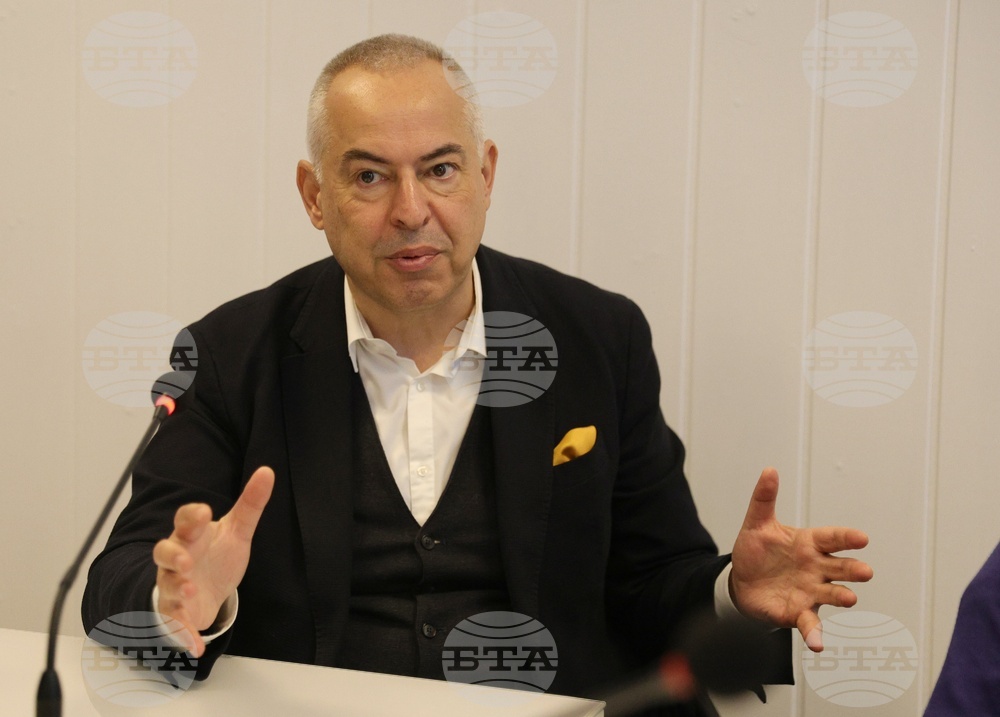site.btaBTA's Europe on Balkans Cohesion Skills Conference Refutes Cliché about Bulgarians and Romanians, Says Journalist Boyko Vassilev


Today's event refutes the cliché that Bulgarians and Romanians don't know each other and can't work together, said the host of the weekly programme Panorama on the Bulgarian National Television Boyko Vassilev during a cross-border conference as part of BTA's Europe on Balkans: Cohesion Skills project. The conference took place at the BTA National Press Club here on Tuesday.
"[This cliche is] Namely that we, Bulgarians and Romanians, have a hard time working together, that we don't know each other and that we don't use Europe's resources to do our own things", he stressed, adding that he knows how this cliché was born. "Romania and Bulgaria were always together in tandem for the accession of both, NATO and the EU. After that they remained the two neighbouring countries that knew each other the least. I always wondered why", he emphasized. Vassilev pointed out that even during communism the two countries knew a lot about themselves - in the literal sense of the word, as Bulgarians followed Romanian literature and art, and even knew Romanian TV series, while many Romanians also watched the Bulgarian National Television.
"However, somehow this knowledge has been lost over the last 30 years, because we decided that instead of looking at ourselves, we can look separately to the West, to Europe. I have always considered this to be quite wrong, because it leads to a rather comical competition: who is more pro-West and who is less Balkan?", Vassilev stated, adding that Romania, just like lots of other countries in the region, do not want to be part of the Balkans at all. "Only Bulgaria cannot escape them, because the mountain in question runs through its middle," Vassilev said.
He emphasized that no one wants to be labeled as part of the East, noting that at a similar conference he had suggested that countries unite around the politically correct name, calling themselves part of "the Region". "Because in this funny and comical competition, in which in the end we will all arrive at the same time in the West, we lose incredible knowledge about each other", he stressed.
Vassilev recalled that he had recently interviewed the Romanian writer Mircea Cartarescu, finding out in the process that there is a community in Bulgaria that likes the writer very much. "Prof. Ivan Stankov from Veliko Tarnovo University has found time not just to translate Cartarescu, but to translate most of Cartarescu. And anyone who knows the work of this writer knows very well that if you collect a few of his larger books and drop them by accident, they can break your legs, as the writer himself told me," Vassilev noted.
He said that in his opinion, one of the biggest dangers in today's world is that people are starting to live in a world without intermediaries. "We, journalists, are becoming more and more redundant because politicians can use Facebook and Instagram. PR people are also becoming more and more redundant because you don't need an intermediary to go online. WikiLeaks is compromising the greatest value in diplomacy: secrecy", he stressed.
"Our leaders don't even need a very good ambassador to be able to hear each other on the phone, if, of course, they speak languages. And translators are worried about the secrecy that AI brings and whether it will take away their profession," Vassilev added. He pointed out that a world without intermediaries is a very sad world, in which everyone shouts their story through the networks and is not at all interested in the stories of others.
"It is extremely important, for example, that BTA has here not just a correspondent, but an intellectual, a truly good journalist and a person who can bring together the worlds and like them together and separately, in the person of Martina Gancheva," Vassilev complimented BTA's correspondent in Bucharest. He stated his hope that everyone can be such a mediator and that people will show that the world needs mutual understanding and interpretation.
"That is when we will understand how close we are. Just as the theory of the Balkan Language Union was created at the time, which shows that although our language is Slavic and your language is Latin, they obey the same grammatical rules," Vassilev said.
"The only great thing we can say to Europe today is that with our ability to be mediators, we can bring the European and the national together. And to convince Europe that the clash between identity and globalization is meaningless, as Bulgarians and Romanians know very well who they are. We love our homeland, we hold it dear, but that does not make us less European. I think Europe needs this lesson from the Balkans, even though no one loves the Balkans," he concluded.
BTA's Europe on Balkans: Cohesion Skills project aims to raise public awareness and foster open dialogue about cohesion policy, local achievements, and the implementation of the EU's policy priorities. The project kicked off with a conference in Veliki Preslav in November 2024. The schedule of conferences until the end of September 2025 includes events in the following cities: Blagoevgrad, Burgas, Varna, Veliko Tarnovo, Vidin, Vratsa, Gabrovo, Dobrich, Kazanlak, Kardzhali, Kyustendil, Lovech, Montana, Pazardzhik, Pernik, Pleven, Razgrad, Ruse, Samokov, Svishtov, Sliven, Smolyan, Sofia, Stara Zagora, Troyan, Targovishte, Haskovo, Shumen, and Yambol. Cross-border conferences will be held in Belgrade, Bosilegrad, Bucharest, Edirne, Skopje, and Thessaloniki. The project builds on the Europe in the Balkans: A Common Future and Europe in Bulgaria: A Common Future projects, implemented by BTA in 2023 and 2024, respectively.
/NF/
Additional
news.modal.image.header
news.modal.image.text
news.modal.download.header
news.modal.download.text
news.modal.header
news.modal.text
































